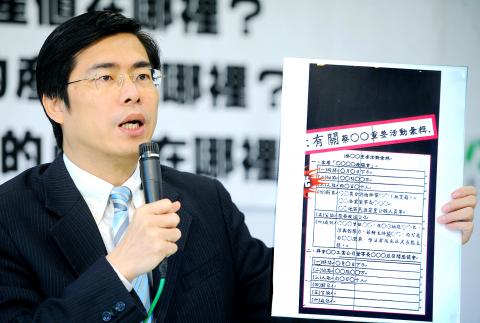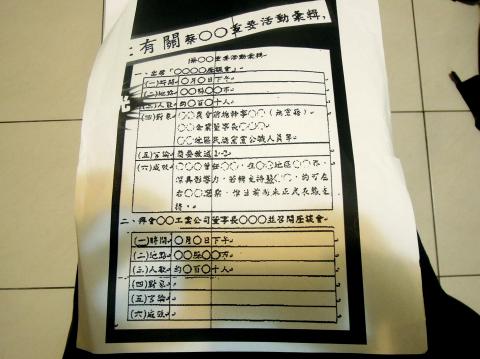The Democratic Progressive Party (DPP) yesterday condemned the intelligence authorities after allegations that they had been monitoring the party’s presidential candidate, Tsai Ing-wen (蔡英文), saying President Ma Ying-jeou (馬英九) should offer a clear explanation.
The Chinese-language Next Magazine yesterday reported that National Security Council (NSC) Secretary-General Hu Wei-chen (胡為真) had acted beyond his authority when he allegedly asked the Ministry of Justice’s Investigation Bureau to monitor Tsai in May.
Since Hu directly reports to Ma, who is seeking re-election as the Chinese Nationalist Party (KMT) candidate, Ma should explain whether he was aware of the illegal practice, Tsai said at a campaign stop in Kinmen.

Photo: Wang Min-wei, Taipei Times
“The President of the [Republic of China] ROC exploited government agencies to collect information to benefit his election campaign ... He is apparently capitalizing on the state apparatus for his own benefit and will have to be held accountable,” Tsai said.
At a press conference in Taipei, DPP spokesperson Chen Chi-mai (陳其邁) described the alleged practice as “Taiwan’s Watergate scandal,” as a president who is seeking re-election was suspected of abusing his power and ordering the intelligence authorities to monitor his opponents to benefit his election campaign.
According to the Next Magazine report, Weng Shih-tsan (翁詩燦), director of the NSC’s Secretariat, attended an intelligence meeting organized by the Investigation Bureau last week and took away information related to the presidential election, before submitting the information to Ma via Hu.

Photo: Lin Shu-hui, Taipei Times
The magazine’s report named 28 senior agents at the bureau, who it said were given the task of monitoring Tsai and submitting weekly reports on the times, locations and the attendees at Tsai’s campaign events.
The magazine said agents also made evaluations on the influence of local politicians or businesspeople who met with Tsai — KMT members and non-partisan representatives in particular — and predicted how many votes were at stake if they offered their support to Tsai.
It also cited an unidentified high-ranking official at the National Security Bureau (NSB) as saying that the NSC and Hu had ignored the intelligence system’s chain of command.
In response to the report, the NSC said that while it did send Weng to the meeting, he did not take any information away and no information had been submitted to Hu and Ma.
The NSB said in a press release that the NSC did not breach the chain of command.
The Investigation Bureau also denied the report. It said in a press release that it is one of the agencies responsible for the security of the presidential and vice presidential candidates, so naturally it knows about the candidates’ campaign activities. However, it said it does not get involved in the election, adding that while it analyzes and responds to the security situation, it does not offer the Presidential Office or the NSC candidates’ campaign information.
At a separate press conference, the DPP caucus criticized the alleged illegal monitoring.
On Dec. 23, 2008, Ma urged the Investigation Bureau’s agents to pledge loyalty to the country, the Constitution and the people, rather than the president or their superiors, DPP Legislator Lin Shu-fen (林淑芬) said.
Ma also said during a presentation last week that he would withdraw from the election if he “had resorted to the state apparatus for political oppression of his opponents,” Lin added.
Lin said she wondered whether Ma dared to make the same pledge again now that it was clear that the NSC, which is in charge of formulation and coordination of national security and defense policy, has become an agency that collects domestic election information.
When approached by reporters during a visit to a market in Greater Taichung, Ma said he had no knowledge about Tsai’s campaign schedule and he simply said “no” when asked whether he had instructed the NSC to collect information on Tsai.
Additional reporting by Rich Chang and Mo Yan-chih

ENDEAVOR MANTA: The ship is programmed to automatically return to its designated home port and would self-destruct if seized by another party The Endeavor Manta, Taiwan’s first military-specification uncrewed surface vehicle (USV) tailor-made to operate in the Taiwan Strait in a bid to bolster the nation’s asymmetric combat capabilities made its first appearance at Kaohsiung’s Singda Harbor yesterday. Taking inspiration from Ukraine’s navy, which is using USVs to force Russia’s Black Sea fleet to take shelter within its own ports, CSBC Taiwan (台灣國際造船) established a research and development unit on USVs last year, CSBC chairman Huang Cheng-hung (黃正弘) said. With the exception of the satellite guidance system and the outboard motors — which were purchased from foreign companies that were not affiliated with Chinese-funded

PERMIT REVOKED: The influencer at a news conference said the National Immigration Agency was infringing on human rights and persecuting Chinese spouses Chinese influencer “Yaya in Taiwan” (亞亞在台灣) yesterday evening voluntarily left Taiwan, despite saying yesterday morning that she had “no intention” of leaving after her residence permit was revoked over her comments on Taiwan being “unified” with China by military force. The Ministry of the Interior yesterday had said that it could forcibly deport the influencer at midnight, but was considering taking a more flexible approach and beginning procedures this morning. The influencer, whose given name is Liu Zhenya (劉振亞), departed on a 8:45pm flight from Taipei International Airport (Songshan airport) to Fuzhou, China. Liu held a news conference at the airport at 7pm,

AIR SUPPORT: The Ministry of National Defense thanked the US for the delivery, adding that it was an indicator of the White House’s commitment to the Taiwan Relations Act Deputy Minister of National Defense Po Horng-huei (柏鴻輝) and Representative to the US Alexander Yui on Friday attended a delivery ceremony for the first of Taiwan’s long-awaited 66 F-16C/D Block 70 jets at a Lockheed Martin Corp factory in Greenville, South Carolina. “We are so proud to be the global home of the F-16 and to support Taiwan’s air defense capabilities,” US Representative William Timmons wrote on X, alongside a photograph of Taiwanese and US officials at the event. The F-16C/D Block 70 jets Taiwan ordered have the same capabilities as aircraft that had been upgraded to F-16Vs. The batch of Lockheed Martin

GRIDLOCK: The National Fire Agency’s Special Search and Rescue team is on standby to travel to the countries to help out with the rescue effort A powerful earthquake rocked Myanmar and neighboring Thailand yesterday, killing at least three people in Bangkok and burying dozens when a high-rise building under construction collapsed. Footage shared on social media from Myanmar’s second-largest city showed widespread destruction, raising fears that many were trapped under the rubble or killed. The magnitude 7.7 earthquake, with an epicenter near Mandalay in Myanmar, struck at midday and was followed by a strong magnitude 6.4 aftershock. The extent of death, injury and destruction — especially in Myanmar, which is embroiled in a civil war and where information is tightly controlled at the best of times —